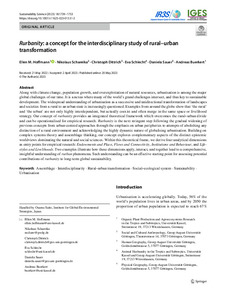| dc.date.accessioned | 2023-07-24T12:30:05Z | |
| dc.date.available | 2023-07-24T12:30:05Z | |
| dc.date.issued | 2023-05-20 | |
| dc.identifier | doi:10.17170/kobra-202307248463 | |
| dc.identifier.uri | http://hdl.handle.net/123456789/14917 | |
| dc.description.sponsorship | Gefördert im Rahmen des Projekts DEAL | |
| dc.language.iso | eng | |
| dc.rights | Namensnennung 4.0 International | * |
| dc.rights.uri | http://creativecommons.org/licenses/by/4.0/ | * |
| dc.subject | Assemblage | eng |
| dc.subject | Interdisciplinarity | eng |
| dc.subject | Sustainability | eng |
| dc.subject | Urbanisation | eng |
| dc.subject | Social-ecological system | eng |
| dc.subject | Rural-urban transformation | eng |
| dc.subject.ddc | 550 | |
| dc.subject.ddc | 630 | |
| dc.title | Rurbanity: a concept for the interdisciplinary study of rural–urban transformation | eng |
| dc.type | Aufsatz | |
| dcterms.abstract | Along with climate change, population growth, and overexploitation of natural resources, urbanisation is among the major global challenges of our time. It is a nexus where many of the world’s grand challenges intersect, and thus key to sustainable development. The widespread understanding of urbanisation as a successive and unidirectional transformation of landscapes and societies from a rural to an urban state is increasingly questioned. Examples from around the globe show that ‘the rural’ and ‘the urban’ are not only highly interdependent, but actually coexist and often merge in the same space or livelihood strategy. Our concept of rurbanity provides an integrated theoretical framework which overcomes the rural–urban divide and can be operationalised for empirical research. Rurbanity is the next stringent step following the gradual widening of previous concepts from urban-centred approaches through the emphasis on urban peripheries to attempts of abolishing any distinction of a rural environment and acknowledging the highly dynamic nature of globalising urbanisation. Building on complex systems theory and assemblage thinking, our concept explores complementary aspects of the distinct epistemic worldviews dominating the natural and social sciences. Within this theoretical frame, we derive four analytical dimensions as entry points for empirical research: Endowments and Place, Flows and Connectivity, Institutions and Behaviour, and Lifestyles and Livelihoods. Two examples illustrate how these dimensions apply, interact, and together lead to a comprehensive, insightful understanding of rurban phenomena. Such understanding can be an effective starting point for assessing potential contributions of rurbanity to long-term global sustainability. | eng |
| dcterms.accessRights | open access | |
| dcterms.creator | Hoffmann, Ellen M. | |
| dcterms.creator | Schareika, Nikolaus | |
| dcterms.creator | Dittrich, Christoph | |
| dcterms.creator | Schlecht, Eva | |
| dcterms.creator | Sauer, Daniela | |
| dcterms.creator | Buerkert, Andreas | |
| dcterms.extent | 1739-1753 | |
| dc.relation.doi | doi:10.1007/s11625-023-01331-2 | |
| dc.subject.swd | Assemblage | ger |
| dc.subject.swd | Interdisziplinarität | ger |
| dc.subject.swd | Verstädterung | ger |
| dc.subject.swd | Nachhaltigkeit | ger |
| dc.type.version | publishedVersion | |
| dcterms.source.identifier | eissn:1862-4057 | |
| dcterms.source.issue | issue 4 | |
| dcterms.source.journal | Sustainability Science | eng |
| dcterms.source.volume | Volume 18 | |
| kup.iskup | false | |


